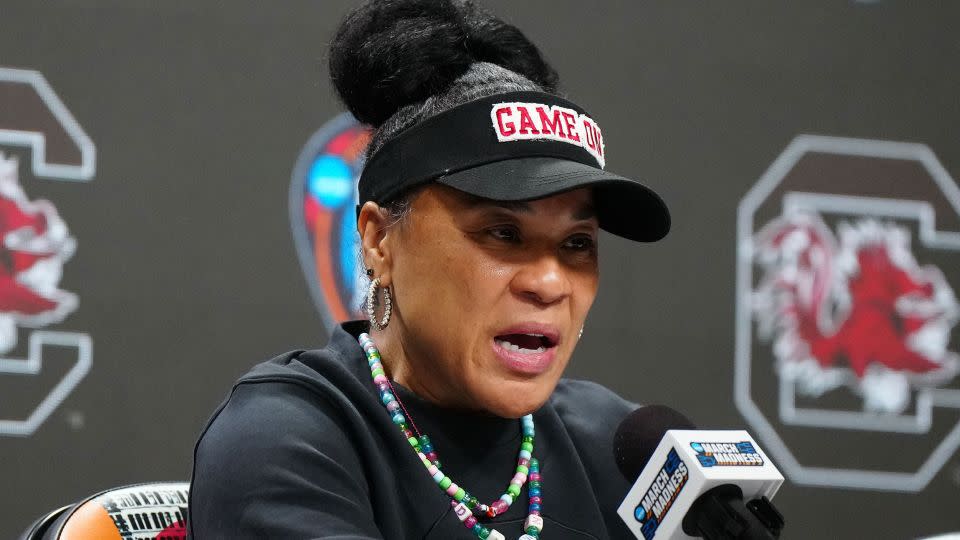National Association of Intercollegiate Athletes effectively bans transgender women from its women’s sports programs
The National Association of Intercollegiate Athletics voted to adopt a new policy Monday that effectively bans transgender women from participating in most of its women’s intercollegiate sports programs.
The NAIA, an athletic association consisting of 241 mostly small member colleges and universities as of 2023, governs intercollegiate athletics for more than 83,000 student-athletes, according to its website .
According to the organization’s new transgender participation policy, “Only NAIA student-athletes whose biological sex is female may participate in NAIA-sponsored female sports. They define “biological sex” as having “distinguishing characteristics and can be supported by birth certificate or signed affidavit.”
Scientists and advocates for the LGBTQ community argue that such definitions do not reflect the biological complexity of sex and gender, and they stress that biology does not override a person’s gender identity.
The new NAIA policy, which takes effect August 1, only bans transgender women and girls from participating. Under the new rules, transgender men and boys can participate on women’s teams without limitation if they were assigned female at birth and have not begun hormone therapy. If they have begun such treatment, they are able to participate in “all activities that are internal to the institution, including workouts, practices,” but the association defers to individual schools to decide if trans men can compete at the collegiate level.
Any NAIA school or institution will also be required to inform the association’s national office if their team has a transgender male student-athlete who has begun hormone replacement. The organization said it will “take the necessary steps to provide appropriate privacy protections.”
Exempt from the new rules are competitive cheerleading and dance, which the NAIA says are open to all students.
Monday’s announcement was met with swift outcry from LGBTQ rights advocates. Athlete Ally, an organization that works to eliminate transphobia and homophobia in sports, said the new policy “only cultivates exclusion and discrimination.”
“This policy is a failure of leadership by NAIA and marks a sad day for women’s sports,” said Athlete Ally founder & Executive Director Hudson Taylor, in a statement shared with CNN.
Chris Mosier, the first transgender man to compete for Team USA, wrote in an Instagram Post that he thinks the decision “is clearly due to political pressure and not any real issue with transgender women in NAIA sports.”
The Human Rights Campaign, an LGBTQ advocacy group, also wrote in a post on X that “making decisions based on right-wing misinformation campaigns is NOT good policy — it’s discrimination.”
In recent years, transgender participation in sports has become a lightning rod in the culture war over LGBTQ rights. Those who support banning trans athletes argue the rules are necessary to enforce Title IX, which ensures separate and equal opportunities for females to participate in sports in federally funded education programs or activities. Critics, however, point out that the people targeted by anti-trans policies are also girls and women being denied their right to participate in sports.
Advocates of banning transgender women from women’s sports have argued that transgender women have a physical advantage over cisgender women in sports.
But mainstream science does not support that conclusion. A 2017 report in the journal Sports Medicine that reviewed several related studies found “no direct or consistent research” on trans people having an athletic advantage over their cisgender peers, and critics say the bans add to the discrimination trans people face.
Debate in the scientific community about whether androgenic hormones like testosterone serve as useful markers of athletic advantage remains ongoing.
In March, more than a dozen current and former female athletes filed a lawsuit against the NCAA, accusing the association of violating Title IX by allowing transgender swimmer Lia Thomas to compete for the University of Pennsylvania’s women’s swim team during NCAA competitions, CNN previously reported.
The NCAA, which governs larger school intercollegiate athletics, requires transgender student-athletes to undergo testosterone testing prior to participating in competitive sports and at specified times thereafter.
But LGBTQ and civil rights supporters say the push to ban trans women from sports a part of a wider effort, often led by conservative lawmakers, to place limits on transgender rights and inclusion in the US.

During a pregame news conference Saturday, reporters asked Dawn Staley, the head coach of the South Carolina Gamecock’s women’s basketball team, if she felt trans women should be able to participate in college sports.
“I’m under the opinion of, if you’re a woman, you should play. If you consider yourself a woman and you want to play sports, or vice versa, you should be able to play. That’s my opinion.” Staley said.
When pressed to elaborate on whether transgender women should be able to participate in college basketball, Staley appeared frustrated.
“Yes. Yes,” she said. “So, now, the barnstormer people are going to flood my timeline and be a distraction to me on one of the biggest days of, of our game and I’m OK with that. I really am.”
The Gamecocks would go on to win the 2024 NCAA Tournament, earning Staley her third NCAA championship in seven years.
For more CNN news and newsletters create an account at CNN.com

